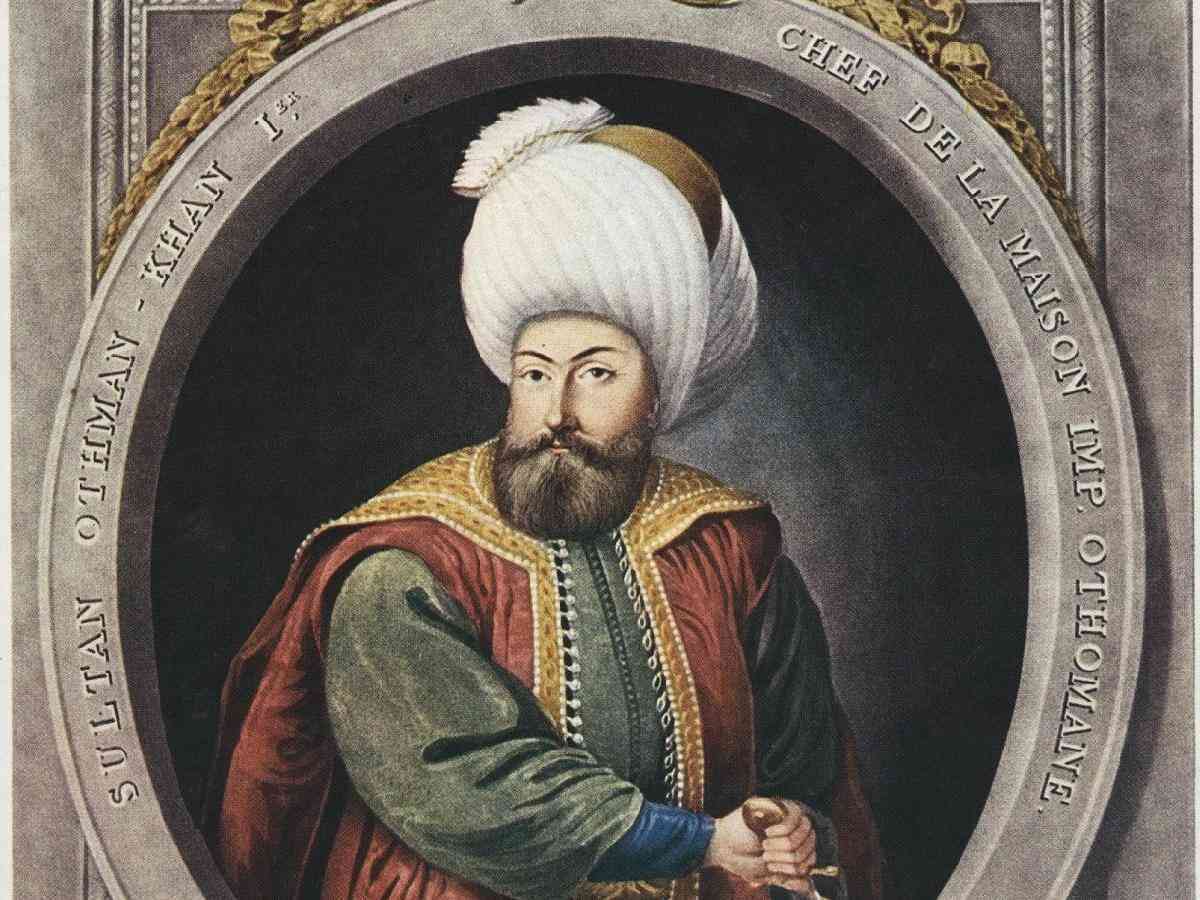Osman Gazi, the founder of the Ottoman Empire, was born into a noble family with a rich lineage. His father, Ertuğrul Gazi, was a prominent leader of the Kayı tribe, a branch of the Oghuz Turks. The Kayı tribe played a significant role in the early formation of the Ottoman state, providing strong leadership and military prowess. Osman's mother, Halime Hatun, was renowned for her wisdom and support, contributing to Osman's upbringing with her nurturing presence. The combination of his father's leadership and his mother's guidance laid a solid foundation for Osman's future endeavors. This strong familial support was crucial in shaping Osman's character, instilling in him the values of bravery, justice, and strategic thinking. The legacy of his parents continued to influence Osman's decisions and his approach to governance, ensuring the stability and growth of the emerging empire.
Birth and Ancestry
Osman I, known as Osman Gazi, was born around the year 1258 in the region that is now modern-day Turkey. His ancestry can be traced back to the Kayı tribe of the Oghuz Turks, known for their nomadic lifestyle and warrior culture. This tribal heritage instilled in Osman a deep sense of honor, resilience, and a commitment to his people. The Kayı tribe's traditions and customs played a pivotal role in shaping Osman's worldview and his approach to leadership. Growing up amidst the rugged landscapes of Anatolia, Osman developed a keen understanding of the region's strategic importance, which later became instrumental in his military campaigns and the establishment of the Ottoman Empire. His ancestry not only provided him with a strong cultural identity but also connected him to a network of alliances and loyalties that proved essential in his rise to power.
Childhood and Education
Osman's childhood was marked by both hardship and education, which together molded him into a capable leader. From a young age, he was trained in the art of warfare, learning horseback riding, archery, and swordsmanship—skills that were essential for survival and leadership in the tumultuous environment of 13th-century Anatolia. In addition to his martial training, Osman received education in governance and diplomacy, learning from experienced leaders and advisors within his tribe. This dual education ensured that Osman was not only a formidable warrior but also a wise and strategic ruler. His upbringing emphasized the importance of justice, loyalty, and the welfare of his people, principles that he would carry forward in his reign. The combination of physical training and intellectual education equipped Osman with the tools necessary to navigate the complex political landscape of his time, laying the groundwork for his future success.
Influences and Mentors
Throughout his early life, Osman was influenced by various mentors and leaders who imparted crucial lessons in leadership and strategy. His father, Ertuğrul Gazi, was his primary mentor, teaching him the intricacies of tribal leadership and the importance of unity among his people. Ertuğrul's experiences in battles and negotiations provided Osman with firsthand insights into the challenges of governance and the necessity of strong alliances. Additionally, Osman's interactions with other tribal leaders and scholars enriched his understanding of different governance models and diplomatic tactics. These influences helped Osman develop a balanced approach to leadership, combining military strength with diplomatic finesse. The guidance he received from his mentors ensured that Osman was well-prepared to face the complexities of establishing and expanding his domain, ultimately leading to the foundation of the Ottoman Empire.
Cultural and Social Environment
Osman's upbringing occurred in a culturally and socially vibrant environment, which greatly influenced his outlook and policies. The region was a melting pot of various cultures, including Turkish, Persian, and Byzantine influences, fostering a spirit of diversity and tolerance. This multicultural setting exposed Osman to different languages, traditions, and administrative practices, broadening his perspective on governance and societal organization. The social structure of the time emphasized loyalty and kinship, values that Osman upheld throughout his rule. Additionally, the prevalent Islamic faith played a significant role in shaping his ethical and moral framework, guiding his decisions and interactions. This rich cultural and social environment provided Osman with a unique blend of traditions and innovations, enabling him to create a resilient and adaptable empire that could withstand the challenges of the era.
Rise to Power
Founding of the Ottoman Empire
Osman Gazi's rise to power was marked by his strategic vision and military acumen, culminating in the founding of the Ottoman Empire. In the late 13th century, the region was fragmented, with various Turkish tribes vying for control amidst the decline of the Seljuk Sultanate and the Byzantine Empire's weakening influence. Osman capitalized on this power vacuum, uniting his tribe and surrounding territories under his leadership. His ability to forge alliances and integrate diverse groups into a cohesive entity was instrumental in establishing a stable and expanding state. The establishment of the Ottoman Empire under Osman's leadership set the stage for one of history's most enduring and influential dynasties. His legacy as the empire's founder is a testament to his exceptional leadership and vision, laying the groundwork for centuries of Ottoman dominance in the region.
Military Campaigns
Osman's military campaigns were pivotal in the expansion and consolidation of his nascent empire. He led numerous battles against rival Turkish tribes and the Byzantine Empire, demonstrating tactical brilliance and unwavering determination. One of his significant victories was the capture of Bilecik, which served as a strategic stronghold and a stepping stone for further conquests. Osman's forces employed guerrilla tactics and leveraged their knowledge of the rugged Anatolian terrain to outmaneuver larger Byzantine armies. These successful campaigns not only expanded the empire's territory but also secured vital trade routes and resources, ensuring economic stability and growth. Osman's military prowess earned him the loyalty of his troops and the respect of his adversaries, solidifying his position as a formidable leader capable of sustaining and growing his empire amidst constant threats.
Political Strategies
Beyond his military achievements, Osman's political strategies were crucial in establishing a lasting empire. He implemented effective governance structures that balanced central authority with local autonomy, allowing for efficient administration and the integration of diverse populations. Osman also employed a pragmatic approach to diplomacy, forming alliances through marriage, trade agreements, and mutual interests with neighboring states and tribes. This diplomatic finesse helped mitigate conflicts and fostered a network of supportive allies essential for the empire's stability. Additionally, Osman focused on economic development, promoting trade, agriculture, and craftsmanship, which boosted the empire's prosperity and attracted settlers from various regions. His ability to combine military strength with astute political maneuvers ensured the resilience and adaptability of the Ottoman Empire, laying a solid foundation for its future expansion and longevity.
Administration and Governance
Osman's administration was characterized by its efficiency and adaptability, ensuring the smooth functioning of the emerging empire. He established a centralized system of governance that streamlined decision-making processes and enhanced the authority of the central leadership. Key administrative positions were filled by trusted and competent individuals who were loyal to Osman, ensuring effective management and implementation of policies. The legal framework under Osman emphasized justice and equity, earning him the support and trust of his subjects. Furthermore, Osman promoted meritocracy, allowing capable individuals from various backgrounds to rise within the administrative hierarchy based on their skills and contributions. This inclusive approach not only strengthened the empire's governance but also fostered a sense of unity and purpose among its diverse population. Osman's administrative reforms were instrumental in maintaining order and facilitating the empire's growth, demonstrating his foresight and commitment to building a robust and enduring state.
Legacy
Impact on Turkish History
Osman Gazi's legacy profoundly impacted Turkish history, laying the foundation for one of the most influential empires in the world. His successful establishment of the Ottoman Empire marked the beginning of a new era in Anatolia, characterized by political stability, economic prosperity, and cultural flourishing. The empire's expansion under his leadership set the stage for centuries of Turkish dominance in Southeast Europe, Western Asia, and North Africa. Osman's emphasis on unity, justice, and effective governance became hallmarks of Ottoman rule, influencing subsequent generations of leaders and shaping the region's socio-political landscape. His ability to navigate complex geopolitical dynamics and foster a resilient state ensured the longevity and significance of the Ottoman Empire in Turkish and world history.
Cultural Contributions
Under Osman's leadership, the Ottoman Empire became a melting pot of cultures, fostering a rich and diverse cultural heritage that continues to influence the region today. He encouraged the blending of Turkish, Persian, Byzantine, and Islamic traditions, resulting in a unique cultural synthesis that permeated art, architecture, literature, and cuisine. Osman's patronage of the arts and support for scholars and artisans led to the flourishing of Ottoman culture, which celebrated diversity and innovation. The architectural advancements initiated during his reign, including the construction of mosques, caravanserais, and fortresses, showcased the empire's aesthetic and engineering prowess. These cultural contributions not only enhanced the quality of life within the empire but also established its reputation as a center of learning and creativity, leaving an indelible mark on the cultural landscape of the region.
Modern Perception
Today, Osman Gazi is revered as a national hero and the founding father of the Ottoman Empire, symbolizing resilience, leadership, and visionary foresight. His legacy is celebrated in Turkey and beyond, with numerous monuments, schools, and institutions named in his honor. Historical narratives portray Osman as a unifying figure who successfully established a powerful and enduring empire through strategic brilliance and unwavering determination. His life and achievements are studied in academic circles, highlighting his contributions to statecraft, military strategy, and cultural integration. The enduring admiration for Osman Gazi reflects his significant role in shaping the course of history and his lasting influence on contemporary Turkish identity and heritage.
Influence on Successors
Osman's foundational work provided a robust framework for his successors to build upon, ensuring the Ottoman Empire's expansion and sustainability. His emphasis on strong leadership, strategic alliances, and effective governance became guiding principles for subsequent sultans and administrators. The administrative structures and military strategies he established were refined and expanded, enabling the empire to grow into a vast and formidable power. Osman's ability to balance central authority with local autonomy allowed for flexibility and adaptability, key factors in the empire's resilience against internal and external challenges. His legacy of leadership excellence and strategic foresight continued to inspire generations, contributing to the Ottoman Empire's enduring prominence in global affairs for centuries.
Economic Foundations
Osman's focus on economic development laid the groundwork for the Ottoman Empire's prosperity and longevity. By promoting agriculture, trade, and craftsmanship, he ensured a stable and growing economy that could support a large and diverse population. The establishment of key trade routes and markets facilitated commerce and cultural exchange, enhancing the empire's wealth and influence. Osman's policies encouraged investment in infrastructure, such as roads, bridges, and caravanserais, which improved connectivity and facilitated the movement of goods and people. This economic foundation not only sustained the empire's growth but also attracted merchants, artisans, and settlers, contributing to its demographic and cultural diversity. The robust economy that Osman fostered played a crucial role in the empire's ability to maintain its military and administrative structures, ensuring its stability and success.
Architectural Achievements
The architectural projects initiated during Osman's reign reflected the empire's growing power and cultural sophistication. He commissioned the construction of fortresses, mosques, and public buildings that showcased advanced engineering techniques and artistic excellence. These structures not only served functional purposes but also symbolized the empire's strength and aesthetic values. The architectural innovations introduced during this period influenced subsequent Ottoman architecture, creating a distinctive style characterized by grandeur, symmetry, and intricate ornamentation. Osman's contributions to architecture laid the foundation for the empire's architectural legacy, which continues to be admired and studied for its beauty and historical significance. The enduring presence of these structures stands as a testament to Osman's vision and commitment to creating a lasting and impressive architectural heritage.
Osman Gazi Biography
In conclusion, the Osman Gazi Biography encapsulates the remarkable journey of a visionary leader who laid the foundations of the Ottoman Empire. Osman's early life, shaped by a strong family background and a rich cultural environment, equipped him with the skills and values necessary for leadership. His strategic military campaigns and astute political strategies facilitated the empire's expansion and consolidation, while his emphasis on effective administration and economic development ensured its stability and prosperity. Osman's legacy extends beyond his lifetime, influencing Turkish history, culture, and identity for centuries. His enduring impact is reflected in the empire's architectural achievements, economic foundations, and the respect he commands in modern perceptions. The Osman Gazi Biography highlights the qualities of resilience, wisdom, and visionary foresight that defined his rule and secured his place as a foundational figure in world history.
Summary of Osman Gazi's Life
Osman Gazi, born around 1258, emerged as a pivotal figure in Turkish history by founding the Ottoman Empire. His noble lineage from the Kayı tribe and the guidance of his parents, Ertuğrul Gazi and Halime Hatun, provided a strong foundation for his leadership. Growing up in a culturally diverse Anatolia, Osman received both martial training and education in governance, preparing him for the challenges ahead.
Osman's rise to power was marked by strategic military campaigns against rival tribes and the Byzantine Empire, showcasing his tactical brilliance and determination. The capture of key territories like Bilecik was instrumental in establishing the empire's initial stronghold. Beyond his military prowess, Osman's political strategies, including effective governance and diplomatic alliances, were crucial in uniting diverse populations under his rule.
Under Osman's leadership, the Ottoman Empire experienced significant economic growth and cultural flourishing. He promoted trade, agriculture, and craftsmanship, ensuring economic stability and prosperity. The architectural advancements initiated during his reign, including the construction of mosques and fortresses, reflected the empire's aesthetic and engineering capabilities.
Osman's legacy is deeply ingrained in Turkish history, symbolizing resilience, leadership, and visionary foresight. His administrative reforms and emphasis on justice and equity laid the groundwork for the empire's enduring governance structures. The cultural synthesis fostered during his reign contributed to a rich and diverse Ottoman heritage that continues to influence the region today.
Modern perceptions of Osman Gazi celebrate him as a national hero and the founding father of the Ottoman Empire. His life and achievements are studied extensively, highlighting his contributions to statecraft, military strategy, and cultural integration. The respect and admiration he commands today reflect his significant role in shaping the course of history.
Osman's ability to balance central authority with local autonomy ensured the empire's adaptability and resilience against internal and external challenges. His focus on economic development and infrastructure investment created a robust foundation for sustained growth and expansion. The strategic alliances and diplomatic maneuvers he employed were essential in securing the empire's stability and fostering a network of supportive allies.
The architectural projects commissioned by Osman showcased the empire's growing power and cultural sophistication. These structures not only served functional purposes but also symbolized the empire's strength and aesthetic values. Osman's contributions to architecture established a distinctive Ottoman style characterized by grandeur and intricate ornamentation.
Osman's impact on Turkish history is further evidenced by the empire's prolonged influence in Southeast Europe, Western Asia, and North Africa. His leadership principles and strategic insights provided a model for subsequent sultans, ensuring the empire's dominance and longevity. The economic and cultural foundations he established were crucial in maintaining the empire's prosperity and significance on the global stage.
In essence, Osman Gazi Biography presents a comprehensive overview of a leader whose vision and actions laid the cornerstone for one of history's most enduring empires. His legacy continues to inspire and shape contemporary Turkish identity and heritage, underscoring his pivotal role in the annals of history.



